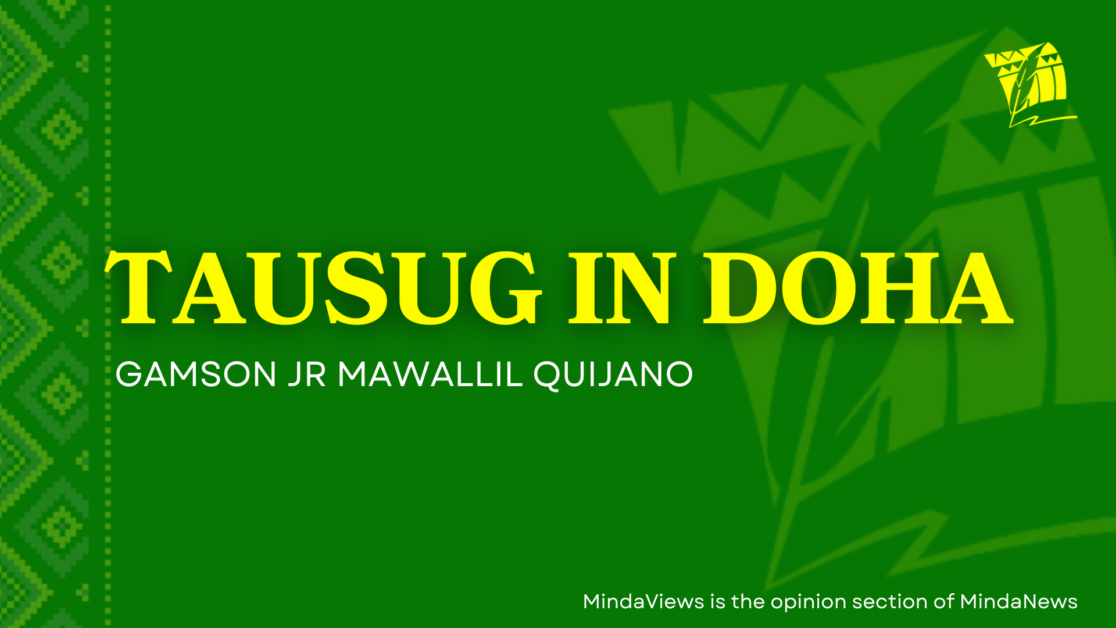
DOHA, Qatar (MindaNews / 23 July) — During the holy month of Ramadhān, the ninth lunar month of the Islamic calendar, Muslim believers perform obligatory fasting from food and drink starting before the first light of dawn and ending upon sunset with a significant and joyous moment of Iftār, or the breaking of the fast.
The Prophet Muhammad (peace and blessings of Allāh be upon him) said: “…he who fasts has two joys: a joy when he breaks his fast and a joy when he meets his Lord…” [Hadith 10, 40 Hadith Qudsi]
Iftār, a beautiful gift from Allāh, is a moment for families and loved ones to come together at one dining table or any place where they are comfortable to break their fasting. It’s a time to share simple food and drinks, mostly prepared heartily by a mother, and to strengthen relationships, love, and compassion with each other.
It’s genuinely unique how, during this month and at Iftār, the dining table is filled with various kinds of viands and drinks. It’s as if every Iftār is a special occasion with various delicious foods to enjoy.
Well, aside from the food that we cook at home, some generous neighbors would also share their food with us. This is a true display of kindness and generosity that fills our hearts with gratitude and joy.
During Iftār, we don’t just indulge in food and drinks. It is also a time for us to reflect on the blessings of Allāh and express gratitude for completing another day of fasting in obedience to His command.
Fasting is an act that goes beyond just refraining from food and drink. It is a time to exercise self-control and eliminate negative behavior such as gossip and slander, among others. Even married couples abstain from intimacy during fasting hours. Embracing this practice helps us develop discipline and cultivate good habits.
When I was young, my beloved mother would ask me to accompany her to the Jolo public market as early as 2 p.m. to buy everything she needed to cook for Iftār. As Jolo is a town with a predominantly Muslim population, people tend to go to the market together to buy everything they need for Iftār, resulting in heavy traffic on the road leading to the market.
Upon reaching the Jolo public market, I witnessed a large crowd moving closely together, which seemed to happen only during the Ramadhān season. At the market, I can find a variety of fresh fish, mouthwatering seafood, Tausūg confectioneries, exotic fruits, and more to enjoy during Iftār.
Earlier today, I had a wonderful group Iftār experience with my fellow overseas Filipino worker (OFW) cousins and friends, who have become like family over time. We gathered at Mina Park in Doha, along with their spouses and children, to break our fast together. The visiting parents of one of our friends also joined us during the Iftār.
We combined the dishes everyone brought, such as chicken kaliya’, laing, fried fish, agar-agar salad, crabs, beef pares, lomi, sardines with misuwa, siyanglag, hard-boiled tapioca, pastil, and some Tausūg confectioneries like pali’ kambing, pān-pān and wadjit; of course, the always fave hot Kahawa Sūg!
We regretted our oversight when we discovered that we had not brought any cooked rice to accompany our dishes, even though it would have been the perfect accompaniment. Nevertheless, that didn’t stop us from enjoying the delicious dishes. Alhamdu Lillāh, it was an evening filled with great food and the best company.
Having Iftār outdoors is an excellent idea as you’ll have the opportunity to witness several families and individuals performing their Iftār, too, at the park. The best part is that the weather is still slightly cooler, making it an even better experience.
Ever since I became aware of my Islamic faith at a young age, I have noticed that during Ramadhān, there is a unique feeling of happiness and contentment that fills every Muslim household and community, especially in the hours before Iftār. Despite being hungry and thirsty, those who are fasting exhibit a grateful and gracious demeanor.
It is heartening to see many Muslim groups and individuals dedicating their time and resources to preparing food for Iftār during the holy month of Ramadhān. This beautiful tradition reflects the spirit of generosity and compassion that is at the core of Islam.
In Islam, giving food for Iftār to fasting individuals is greatly rewarded, and hence, many people make extra food for Iftār to share with relatives, friends, and especially those less fortunate.
The Prophet Muhammad (peace and blessings of Allāh be upon him) said: “Whoever gives food for a fasting person to break his fast, he will have a reward like theirs, without that detracting from their reward in the slightest.” [Sunan Ibn Majah 1746]
During Iftār today, I couldn’t help but reminisce about the special moments shared with my beloved parents and siblings during Ramadhān. The last time I spent the entire month of Ramadhān with them was in 2020, when my vacation was extended due to the Enhanced Community Quarantine (ECQ) during the pandemic’s peak.
My beloved mother’s comforting porridge, which has become our traditional food for Iftar, is the first food we eat after a long day of fasting. Porridge is a light and soothing meal that is perfect for breaking the fast. My beloved mother’s simple and healthy food has not only brought our family closer together but has also filled us with warmth and a sense of togetherness.






